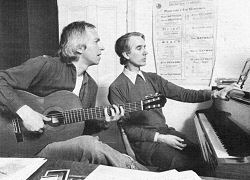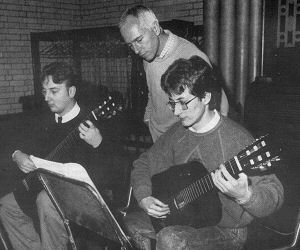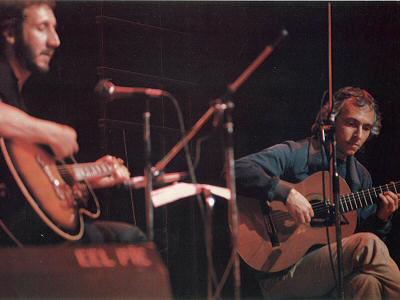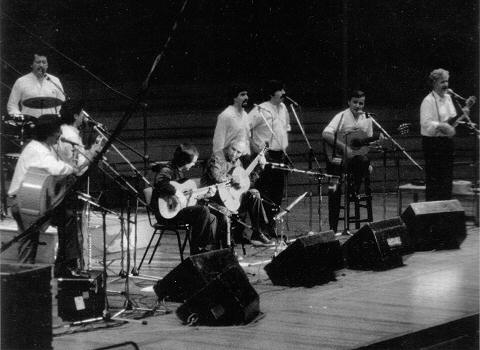 |
|
 |
 |
 |
|
|
The release of Sky's first album in the early summer of 1979 came as something of a shock to the classical world. Amid cries of "traitor" and "fickle", Williams maintained his composure and, with a wry smile, did his best to dispel fears that his latest project meant the end of his classical career. The five years he was to spend with Sky were to prove probably the busiest of his career, and much to the relief of guitar afficionados, he alternated his work with the band with further classical record releases and concert tours. There is also a popular misconception that work with Sky entailed playing electric guitars - despite the photograph above, he only used an electric guitar on about four of Sky's repertoire of over 50 compositions. Electric duties were the province of Kevin Peek, while Williams stuck resolutely to a variety of acoustic instruments - over time, live performances became limited to using just a Takamine electro-acoustic.
The attitude of the classical establishment can best be summed up with John Duarte's review of the first album for Gramophone, the definitive guide to classical recordings:
As revealed during a joint radio interview in 2005, these concerts were the occasion for the chance meeting with someone who was to prove to be a close collaborator on many projects in later years, multi-instrumentalist and composer Richard Harvey. Richard was playing the bouzouki on stage, deliberately annoying John Cleese during the Monty Python Cheese Shop sketch, to be eventually ordered off the stage - straight into the arms of John Williams, waiting to come on for his own contribution to the show. (I would remind them both, however, that the recording sessions for Travelling, in which Harvey participated, and to which he even contributed one of the arrangements, happened a full twelve months earlier.) Two years later, to mark Amnesty International's 30th Anniversary, he and Sky played a memorable concert in Westminster Abbey. In 1980, after returning from a solo tour of Australia in the spring, despite (or perhaps, because of) his eclectic perfoming schedule, he was awarded the Order of the British Empire by the Queen, one of the highest honours available to non-British citizens (although he's lived most of his life in England, Williams proudly remains an Australian national), although he has never used the title and the fact is not mentioned in his short biographies. Although Sky was to be the main focus of Williams' activities for the next five years, he maintained a steady output, making his usual new recordings every year, of Boccherini Quintets with the London String Quartet (1980), a solo Albéniz album (1981), and possibly one of the strangest duets ever, that of guitar and organ with Peter Hurford (1982). He also duetted on stage with "folk" singer Ralph McTell during a benefit concert for The Samaritans at Christmas 1982. All of these recordings were accompanied by public performances of the material, so despite the British media's interest in Sky, John Williams remained steadfastly true to his core repertoire. During his 1981 trip to Australia, he met someone who was to have an uncredited but huge influence on his work afterwards, luthier Greg Smallman. Smallman guitars have been Williams' main instrument both on the concert platform and in recordings ever since. Furthermore, in the summer of 1983 he found time away from a busy schedule with Sky's UK, European and Far East tours not only to record another album with Cleo Laine and perform at the Wavendon Festival, but to re-form John Williams and Friends and release an album of folk tunes, Carlos Bonnell's place in the lineup taken by close friend (and London neighbour) Paco Peña, and Gerald Garcia. The ensemble toured extensively throughout the UK and Europe over the next three years. 
After a Christmas concert coinciding with the release of Sky's sixth album at the end of 1983, he decided to leave Sky and returned to his classical roots with a passion. In September at the Royal Festival Hall, he premiered a new work by Patrick Gowers, The Stevie Concerto, based on material written for the soundtrack of Stevie in 1978, a film about the English poetess Stevie Smith. In 1984 he was invited to be Artistic Director of the South Bank Summer Music Festival. This annual event had been created in 1968 by Daniel Barenboim, whose idea was to form a programme of events to rival the mighty Proms, with the emphasis on variety and smaller ensembles and soloists, whose talents could not be appreciated in the massive Albert Hall across the Thames, organised by a musician rather than a bureaucratic committee. The season was a tremendous success, both in artistic and financial terms, with Williams making a great many appearances himself and surrounding himself by friends such as Paco Peña, Cleo Laine, the Medici Quartet, Peter Hurford and others. On 2nd October, he performed the premiere of Takemitsu's concerto for guitar and oboe d'amore Vers l'arc-en-ciel, with Simon Rattle and the City of Birmingham Symphony Orchestra, a work the Japanese composer was commissioned to write for this orchestra, and which Williams recorded in 1992 with the London Sinfonietta. He was to return to Birmingham two years later for a live broadcast of the Concierto de Aranjuez with Rattle and the CBSO to mark the Tenth Anniversary of the National Exhibition Centre, a multimmedia extravaganza with flashing lights and lasers, bringing the presentation of classical music world even closer to the world of rock'n'roll. The concert was staged in the NEC's Arena, one of the largest indoor venues in Britain (seating some 17,000) and usually more accustomed to the presentation of rock concerts. Williams was evidently at ease in these surroundings, partially from his experiences with Sky, but the same cannot be said of the audience, most of whom seemed to have no idea what to expect... 
In 1985 he returned to run the South Bank Summer Festival, and with an even more versatile programme of events (many of which again featured him), including many workshops and lectures for younger audiences on topics like the history and variety of guitars, percussion instruments (run by Sky drummer Tristan Fry), and others, brought the South Bank Centre back to a prominent position in the British arts scene Williams was asked to run the Festival again in 1986 but he declined, taking a stand against the abolition by Margaret Thatcher's government of the Greater London Council, responsible for the funding of the South Bank Centre. Instead, he toured Spain with the Academy of St. Martin-in-the-Fields and made a highly successful American tour. He also gave a recital in Paris at the Salle Pleyel and took part in the Classic Aid concert in Geneva, masterminded by Lorin Maazel in aid of the United Nations Fund for Refugees. He was also asked to score a small Australian film called Emma's War, one of the few examples of Williams' own compositions. 1987 was to prove not only his busiest year since leaving Sky, but also one of the most varied. He opened the year as Artistic Director of the Melbourne Arts Festival, returning to the UK for a tour with John Williams and Friends. He then undertook a summer tour with the National Youth Jazz Orchestra, presenting the latest in his not quite classical commissions: Paul Hart's Concerto for Guitar and Jazz Orchestra. To make a busy year even busier, the self-avowed non-jetsetter appeared at the Toronto International Guitar Festival, performing the world premiere of Leo Brouwer's Fourth Concerto, composed for him, which was to be one of the centrepieces of a recording for Sony Classical The Black Decameron a decade later.
He ended the year with yet another UK tour, this time with Paco Peña and Inti Illimani. The two guitarists had had a long association with the Chilean group, mainly appearing in guest slots during their concert appearances, but over time this culminated in musical director Haracio Salinas writing new material for a fully integrated programme, which was unveiled at three sell-out concerts at the Edinburgh Fesitval. Since the Intis' return to their homeland in 1988, Williams and Peña have participated in several South American tours with the group. Taking a well-earned rest, he attended the sole Sky concert that year in November at the Royal Albert Hall (as a member of the audience), and his first appearance in 1988 was with another new work, an guitar concerto by Sky team-mate Steve Gray (with Williams being so busy in 1987, and Gray arranging and recording the latest Sky record, when did they find time to compose, agree and rehearse the new work?). The work was recorded two years later, although not released for another five. Williams could have been forgiven for taking things easy in 1988. But after appearing on the soundtrack to A Fish Called Wanda, he made new recordings of Bach, Weiss and Couperin, supported by a UK tour in May, and in August made his debut at the Promenade Concerts with the Hart Concerto. He had delayed his first appearance at probably the most famous music fesitval in the world because he had wanted to present a work appropriate for the large venue. As he said at the time, Well, it would have been a bit naff if, after 30 years, I'd made my Proms debut with the Rodrigo, wouldn't it? (he has since played the Rodrigo at the Proms, both during the 1997 season, and in 2005 it is the main highlight of the first half of the famous Last Night). 
He ended the year at the Barbican's Christmas Festival, playing the Rodrigo (a last-minute substitution for the scheduled Vivaldi Concerto in D) with the English Chamber Orchestra, and then indulging in some seasonal spirit with Paul hart for the finale. Although stage appearances in 1989 were, understandably, thin on the ground, Williams still made the occasional appearance, most notably during the Exeter Festival in the summer, performing in the world preimiere of Richard Harvey's "eco-oratorio" for orchestra, voices and guitar, Plague and the Moonflower, which would be recorded a decade later. Towards the end of the year he was part of celebrations of the 25th anniversary of his association with CBS Records and worked on the CD release of some of his back catalogue. In December, he contributed to a two-day masterclass at the Royal Northern College of Music in Manchester.
|

 Between his classical concert engagements and duties with Sky that year, in June he found time to participate in the
Between his classical concert engagements and duties with Sky that year, in June he found time to participate in the 


